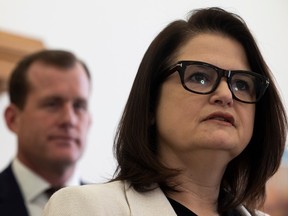Despite only a modest increase in funding for the RCMP, leadership from the force and a union representing its members indicated a hopefulness about a relationship with the government.

Article content
In an era where concerns about crime have found the listening ears of politicians, policing was not a topic which dominated the discourse following the release of Saskatchewan’s provincial budget on Wednesday.
But behind the noise about issues like health care, education and social services, those concerned with crime and addressing it were watching, nonetheless.
Advertisement 2
Article content
Article content
While big on spending, the deficit budget broadcasts a bump of only $4.3 million to the RCMP for operations — a relatively modest increase, considering over $200 million is put toward the total operating cost of the police force, which takes on a large role in Saskatchewan, particularly in rural areas.
At the same time, for the second year in a row, $7 million was devoted to the Saskatchewan Marshals Service — a provincial police service that’s not expected to be in operation until 2026.
Considering the big-ticket spending in Wednesday’s budget (education received an increase of $180-million), the funding for the marshals, while certainly not insignificant, is also relatively small.
Nonetheless, it was mentioned by both the government and the opposition.
When asked what in the budget demonstrates that community safety is a “priority” as the budget suggests, Finance Minister Donna Harpauer pointed to the funding for the marshals service.
Unsurprisingly, the opposition takes a different view.

“They’ve spent $14 million on that redundant and costly service, with no new boots on the ground,” NDP finance critic Trent Wotherspoon said.
Article content
Advertisement 3
Article content
Why would the province spend money on the marshals when they could put the money into police forces already operating “and actually get more officers out sooner to communities,” NDP leader Carla Beck wondered, acknowledging a need to address crime.
Saskatchewan Urban Municipalities Association (SUMA) president Randy Goulden said her organization is concerned that staffing the marshals may result in taking officers away from already existing forces.
Saskatchewan Association of Rural Municipalities (SARM) president Ray Orb said his organization is of the opinion that the RCMP should be “fully funded,” noting the Mounties are “already in place,” but he acknowledged issues in bringing in recruits.
Both SUMA and SARM are eager for a seat at the table in future discussions about policing.

Minister of Corrections, Policing and Public Safety Paul Merriman said there have been start-up costs for the Saskatchewan Marshals Service like there would be for any new organization.
“We’ve got some capital items that are in there, such as vehicles, equipment,” he said. “We’ve got to look at space that we’re leasing out, as well as a lot of operational stuff that has to be done in the prep work.”
Advertisement 4
Article content
Merriman said that there have been over 125 applications so far for the 70 positions announced for the marshals service, and he acknowledged Goulden’s concern.
“We’re looking at how we can recruit from out of province,” he said. “We’ve had a lot of interest from outside of Saskatchewan.”
But he was also quick to point toward additional funding of the Mounties, and said the RCMP needed support in staffing.
Wednesday’s budget fell far short of the additional $100 million over five years for the hiring of 300 officers, as requested by the National Police Federation (NPF), the union that represents a large swath of Mounties.
Merriman said the proposal had come “late in the budgetary process,” but he said he’s made commitments to work with local Mounties and the federal government to “shore up” staffing for the RCMP.
“We need to bring more officers in here,” he said, noting he and RCMP Asst. Commissioner Rhonda Blackmore are working on a plan on that front.
“If there’s more officers, we will pay.”

Blackmore, Saskatchewan’s top Mountie, took a positive tone, calling the modest funding bump in the budget a “great start for us,” noting it would go toward covering some cost of inflation.
Advertisement 5
Article content
She went on to say Merriman had committed to having ongoing discussions about pressures facing the national force in Saskatchewan, and to funding positions “as we’re able to supply the positions.”
The issue, she said, is the RCMP would not commit to sending new recruits to Saskatchewan without funding in place.
She called Merriman’s commitment a “huge step forward.”
“We’ll see additional funds throughout the year that goes towards those human resources as we can supply them.”
As for the marshals, she said the Mounties would rather see that funding come to them, but so long as the government is funding the RCMP, “to us, that’s the important piece.”

NPF Prairie Region Board Director Morgan Buckingham, who praised Blackmore for her work on staffing, said his organization doesn’t believe there’s public support for the marshals, based on a survey it commissioned.
“We continue to agree to disagree with the government,” he said.
Crime, investigation complexity and police workload are increasing alongside the provincial population, Buckingham said, noting he believes Saskatchewan residents would rather see the money go to police services already in place.
That said, he too spoke positively of Merriman, saying his organization had formed a “great relationship” with the minister who only took on his current role in August.
“We’re hopeful for what the future has in store for the RCMP with this government,” Buckingham said. “But obviously that’s not reflected in this budget this year.”
Article content



